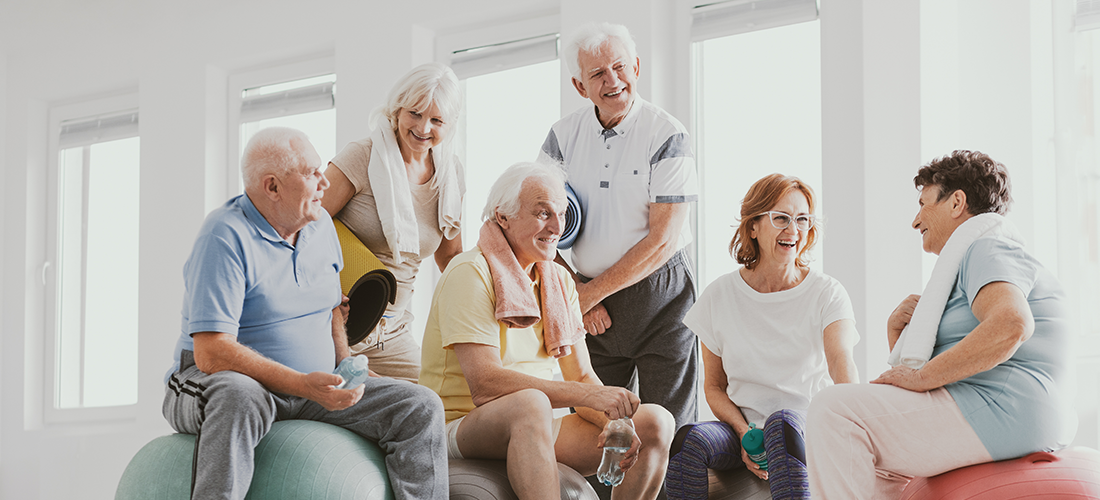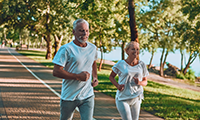 Contact
About Us
Articles
Home
Contact
About Us
Articles
Home

Exercise is important at any age, but it becomes increasingly important for individuals 65 and older. Maintaining an active lifestyle as you age is perhaps the single most important thing you can do to help maintain your health and independence.
Staying active is an essential component of maintaining your mental and physical health as you age – and there’s no wonder drug that can replace exercise.
“It’s the best medicine out there,” says geriatric specialist Dr. Ronan Factora. “There is no pill that can actually substitute for being physical active.”
Research shows that regular physical activity helps prevent disease, improve mental health, increase mobility, preserve independence and improve overall physical health. It doesn’t matter so much what type of exercise you do, as long as you’re active on a regular basis.
For many, exercise has additional benefits. It’s a good way to connect to other individuals and to stay involved in the community. Whatever type of exercise you enjoy – whether it’s a fitness class, gardening, or walking in a park – find something to do and stick with it. Prioritizing physical activity on a daily basis is one of the best things you can do to stay healthy, happy and independent. To compound some of the benefits and to make it a habit, you should find activities that you look forward to and enjoy.
As you age, your body naturally begins to decline, yet physical activity can help to slow that aging process. Unfortunately, many individuals become less active and more sedentary as they age. This change compounds some of the natural effects of aging. To help combat this, it’s important for individuals 65 and older to stay as active or more active as they’ve been throughout life. Doing so can help in four important ways:
Prevent disease.
There is substantial research that indicates that regular exercise decreases the risk of heart disease, type 2 diabetes, some cancers and dementia. In addition, it increases immune system function. For many,
immune system function decreases with age, so this benefit is particularly important for older adults.
Improve mental health.
When you exercise, your body produces endorphins, which are sometimes known as “feel-good” hormones. Endorphins help to relieve stress and increase feelings of happiness. Additionally, studies indicate
that regular physical activity helps to improve moods, reduce the risk of depression, and reduce the risk of dementia.

Further, recent research shows that staying active can help prevent mental decline and reduce the impact of brain damage, which is prevalent in older adults. This study found that the more you move, the less impacted you will be by common brain damage from aging, which often impacts mobility.
Finally, an active lifestyle improves sleep, which is important for both mental and physical health. Insomnia is a frequent problem for older Americans, and exercise is an effective way to prevent it.
Maintain mobility and decrease the risk of falls.
Exercise leads to increased strength, flexibility, balance and coordination, and thus a decreased risk of falls. It takes longer to recover from a fall as you get older,
and a fall or an injury can impact your independence. Work to avoid this issue entirely by staying active.
Improve overall health.
Regular exercise helps to maintain a healthy weight and reduces the risk of a stroke. It also helps to manage high blood pressure and cholesterol.
It’s recommended that you get 150 minutes of moderate physical activity every week. An easy way to think of this is 30 minutes of exercise, five days a week. If you’re already active and prefer more vigorous activity, 75 minutes of vigorous activity per week can provide the same benefits.
In addition, it’s also important to integrate strengthening activities into your routine. As you age, you naturally lose muscle mass, so incorporating activities that help build and maintain strength are particularly important for older adults.
It’s worth nothing that daily activities like grocery shopping and cleaning generally don’t raise your heart rate enough to count toward your weekly activity goals. The more active your lifestyle, the healthier you’ll be. So, as you strive to become more active, think about ways that you can move more throughout the entire day. For example, using the stairs instead of an elevator; parking farther away in parking lots; replacing a car trip with walking or biking; or doing more gardening and yardwork.
As you work to become more active, keep in mind that any activity is better than nothing. Also, remember that doing something you enjoy will compound some of the mental health benefits of exercise while also helping you to make physical activity a more regular habit. With those caveats in mind, some good examples of moderate exercise include:
As you build your exercise routine, try to include some activities that involve endurance, strength, balance and flexibility. Here’s an overview of each and some of the benefits they provide:
| Type of exercise | Benefits | Examples |
|---|---|---|
| Type of exerciseEndurance | BenefitsSupports healthy heart, lungs and circulatory system | ExamplesWalking, jogging, swimming, biking, tennis, lawn mowing |
| Type of exerciseStrength | BenefitsIncreases muscle mass and reduces decline of muscles | ExamplesWeightlifting, body-weight exercises (push-ups, sit-ups), resistance band exercises |
| Type of exerciseBalance | BenefitsMaintains mobility and helps to reduce the risk of falls | ExamplesYoga, Pilates, balance exercises (for example, stand on one foot or walk heel-to-toe) |
| Type of exerciseFlexibility | BenefitsKeeps muscles limber and improves mobility | ExamplesStretching; Yoga; Pilates |
It’s worth saying again that any activity is better than no activity. Plus, it’s never too late to adopt an active lifestyle. Research indicates that even if you’ve previously had a sedentary lifestyle, you can benefit from incorporating more activity as you age.
Start gradually and slowly build up the amount of physical activity in your day. In addition, it’s always a good idea to warm up and cool down for five minutes before and after exercise. Finally, it’s important to talk with your doctor before beginning any new exercise routine.
Alliance America is an insurance and financial services company. Our financial planners and retirement income certified professionals can assist you in maximizing your retirement resources and help you to achieve your future goals. We have access to an array of products and services, all focused on helping you enjoy the retirement lifestyle you want and deserve. You can request a no-cost, no-obligation consultation by calling (833) 219-6884 today.


